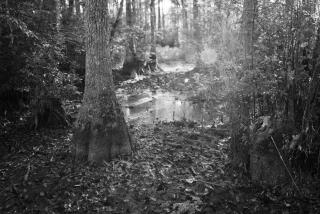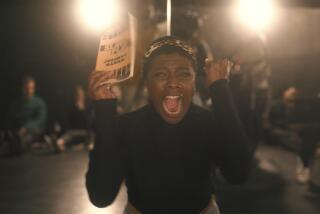Gabrielle Union, herself a sexual assault survivor, on playing a woman who is raped in Nate Parker’s ‘The Birth of a Nation’

Watch the trailer for ”The Birth of a Nation.”
- Share via
Over the course of her more than 20-year career, actress Gabrielle Union, 43, has turned down multiple offers to play a character who is raped, never feeling that a role was worth the pain she would have to endure to perform it. Union, who was raped at age 19 during a robbery at a Payless shoe store where she worked, made an exception last year to shoot a small but pivotal scene in “The Birth of a Nation,” writer-director Nate Parker’s drama about the 1831 Nat Turner slave revolt.
The depiction of rape -- an event that happens off camera but delivers its impact via a haunting look on Union’s face -- serves multiple narrative purposes in the film. It shows the impact of sexual violence during slavery on black women and their families, and it helps inspire Turner’s rebellion. But recent revelations about a rape case in Parker’s past mean the scene will carry a different significance for audiences who see the film when it arrives in theaters Oct. 7.
Union spoke with The Times about rape in her own life and in “The Birth of a Nation” in an interview in August, before Parker’s 2001 acquittal on a rape charge was widely reported in the Hollywood trade press, including the detail that his accuser had committed suicide in 2012, and before Union knew about the case herself. Asked whether she would like to comment on Parker’s case, Union chose instead to write an opinion piece, which The Times published online Friday and will publish on its op-ed page Sunday.
“As important and ground-breaking as this film is, I cannot take these allegations lightly,” she wrote. But she didn’t criticize or distance herself from Parker, and implicitly underscored her support for the movie.
“Since Nate Parker’s story was revealed to me, I have found myself in a state of stomach-churning confusion,” Union wrote. “I took this role because I related to the experience... Regardless of what I think may have happened that night 17 years ago, after reading all 700 pages of the trial transcript, I still don’t actually know. Nor does anyone who was not in that room. But I believe that the film is an opportunity to inform and educate so that these situations cease to occur.”
Union’s opinion piece stood in contrast to some critics of Parker’s, including author Roxane Gay, who wrote an opinion column in the New York Times saying she wouldn’t see the movie, despite its importance.
But Union’s piece sparked a lively conversation — supportive and critical of her — online.
“A very well-written and thought-provoking article,” one reader wrote. Another said, “Gabrielle’s piece is lovely, and so much more thoughtful and sensitive than anything Nate Parker and his PR people have delivered so far.” And a third wrote: “I admire the great courage that it takes to share about the injustice you have experienced. Thank you for encouraging others to speak up.”
But others were less positive. “She remained neutral. She read the transscripts [sic] and says she still is undecided. But to use it as a segway [sic] back to ‘get those people out to see this movie,’” wrote one reader.
Union declined, through her publicist, to comment beyond her op-ed piece.
The actress didn’t take the role lightly.
Union, who is known for her roles in films like “Bring It On,” “Deliver Us From Eva” and “Bad Boys II,” took a break last spring from filming her BET drama series “Being Mary Jane” to fly to the Savannah, Ga., set of Parker’s film to play a slave named Esther, a fictional character who lives on the same plantation as Nat Turner (Parker).
Movie Trailers
“Many times I’ve been offered roles where my character gets raped, and I’ve always said no,” Union, whose husband is NBA basketball star Dwyane Wade, said in the August interview. “I’ve been through too much therapy. I never wanted to go there. It never felt worth it to go there. This role felt worth it and way too important.”
Early in “The Birth of a Nation,” Esther marries another slave, Hark, played by Colman Domingo, in a sweet and simple jumping-the-broom ceremony that supplies a respite from the movie’s many scenes of brutality and hardship. When a drunken white male visitor to the plantation takes a predatory sexual interest in Esther, Hark and Nat try to protect her and fail. Esther’s rape is implied, as is the assault’s role in helping inspire Nat Turner and other slaves on the plantation to fight back.
Esther is one of a few women in the script who serve a crucial function in Nat’s story. Aja Naomi King plays Nat’s wife, Cherry, who also suffers an assault in the film, and who endorses Nat’s decision to retaliate. Penelope Ann Miller plays the white mistress of the house who teaches young Nat to read, unwittingly setting into motion his path to awakening as a preacher.
Esther has no lines in the film, although Union said the character did speak in earlier drafts of the script; she and Parker decided together that the portrayal was more powerful without lines.
“We just really felt that so many of our women then and now have no voice,” Union said. “Especially black women who have suffered sexual violence. There’s literally no recourse. I felt it would be much more powerful if she didn’t speak. You feel her presence, her sense of family. You get a sense of where she is in the larger plantation system, the powerlessness, the voicelessness.”
See the most-read stories in Entertainment this hour »
At the time of shooting, Union did not know about the rape allegations in Parker’s background. In 1999, while a scholarship wrestler at Penn State University, Parker was accused and acquitted of raping a white woman. His roommate, Jean McGianni Celestin, who received a writing credit on the movie, was convicted in the case, but the verdict was overturned. Union said her own history and activism on the subject of sexual assault also wasn’t a major topic of conversation with her director.
“Going into filming, Nate didn’t know that I had been raped,” Union said. “We didn’t really discuss it much. He just trusted that I was going to capture that.”
Shooting on the Savannah plantation, which was set dressed to look like the Southampton County, Va., plantation where Turner launched his rebellion, was a jarring experience for the cast, Union said.
“You definitely felt our people,” she said. “You felt the death. You felt our horror. I’d been to plantations before, but I’d never actually worked on one. It was a surreal experience. You never forgot where you were. Ever. Even with all the lights, cameras and crew. It never left you, what happened there.”
The actress said she had an out-of-body experience while filming the crucial scene where Esther leaves the plantation house after her rape.
“I have literally no recollection of anything after I opened the door,” Union said. “My next memory is seeing the crew applauding, weeping, seeing Nate and our DP [Elliot Davis], and [Domingo], hugging me.”
Union said she had additional sessions with her therapist to manage her anxiety around the scene, some of which was about her performance and some of which was about the larger societal issues at play.
“I just didn’t want to screw it up,” Union said. “It’s such an important piece of Nat Turner’s story. It’s such an important piece of my own story. My biggest hurdle to overcome was, ‘How am I being seen as a woman by everyone else?’ Knowing the world will see the scene, and what will they think?”
Follow me on Twitter for more movie news: @thatrebecca
ALSO
A decades-old college rape case casts cloud over Oscar hopeful Nate Parker
With a cloud over ‘Birth of a Nation,’ which awards contenders might avert #OscarsSoWhite3?
Should ‘The Birth of a Nation’ audiences care about Nate Parker allegations?
More to Read
Only good movies
Get the Indie Focus newsletter, Mark Olsen's weekly guide to the world of cinema.
You may occasionally receive promotional content from the Los Angeles Times.











